Covid in Scotland: How do you hold an election during lockdown?
- Published
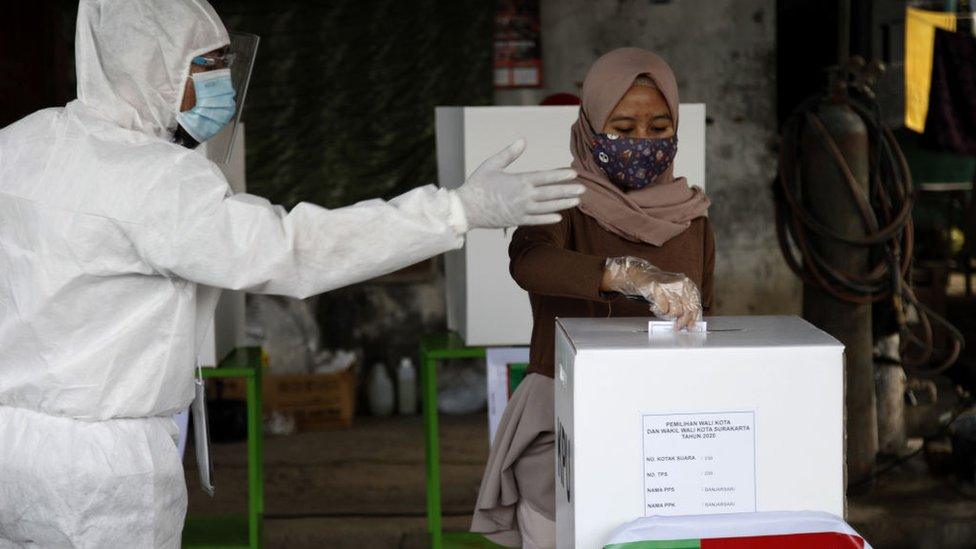
A number of other countries have managed to hold elections despite the pandemic
Scotland has entered a new Covid-19 lockdown, but is also preparing to go to the polls in just a few months time. How can an election take place during a pandemic, and what plans are in place?

Can it be done?
To start with, yes. Many countries have held elections already during the pandemic.
Some, like New Zealand, have had relatively few cases of coronavirus to contend with. But others, like the US, have successfully conducted ballots while in the grip of nationwide outbreaks.
There have even been a number of council by-elections in Scotland over the past year, from Edinburgh and Aberdeen to the Western Isles.
Yes, they featured a far smaller turnout than is expected in May - but they provide vital experience for returning officers in terms of the ease of finding polling places and recruiting staff in the present conditions.
The Holyrood election is not the only one due in the UK this spring, either - there are also elections to the Welsh Parliament and a host of local council and mayoralty contests across England.
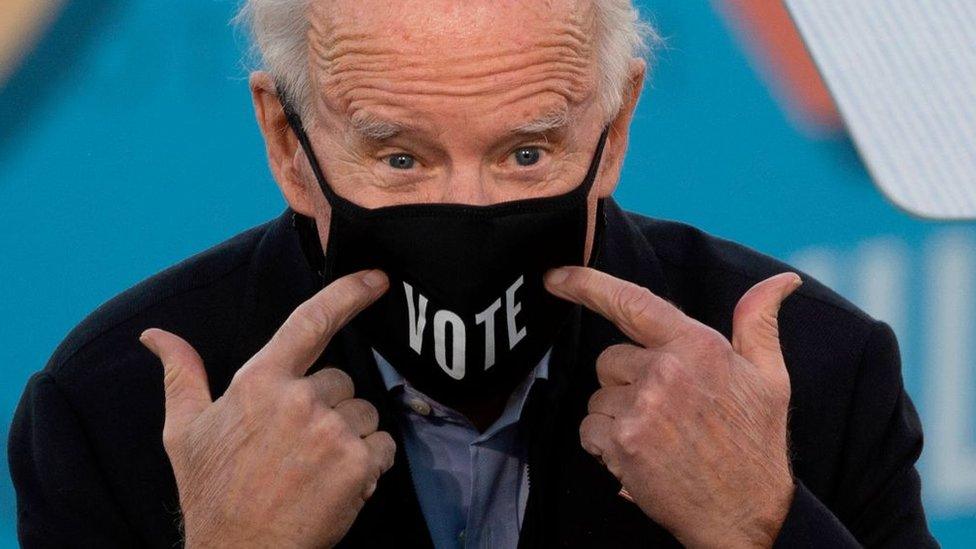
Joe Biden won the US presidency despite doing much of his campaigning remotely
Will it be in May?
As it stands, everyone is still planning for an election on Thursday 6 May.
First Minister Nicola Sturgeon says she can "see no reason at this stage" why it should have to be delayed, despite the fact the vaccination programme will still be ongoing come polling day.
Any change would be a decision for Holyrood as a whole, rather than the government. However the principal opposition party - the Conservatives - have backed Ms Sturgeon's position.
MSPs have introduced contingency plans which would allow the vote to be pushed back by up to six months - either by a vote of parliament, or in the most extreme circumstances via a decree from Presiding Officer Ken Macintosh.
But the hope is that the combination of the vaccine and the other backup plans that have been put in place will be enough for the vote to go ahead safely.
Any delay would likely have implications across the UK, with the races mentioned above in mind - polling and politics guru Prof Sir John Curtice has suggested that a joint approach may ultimately be taken in Cardiff, Edinburgh and London if there are to be any changes.
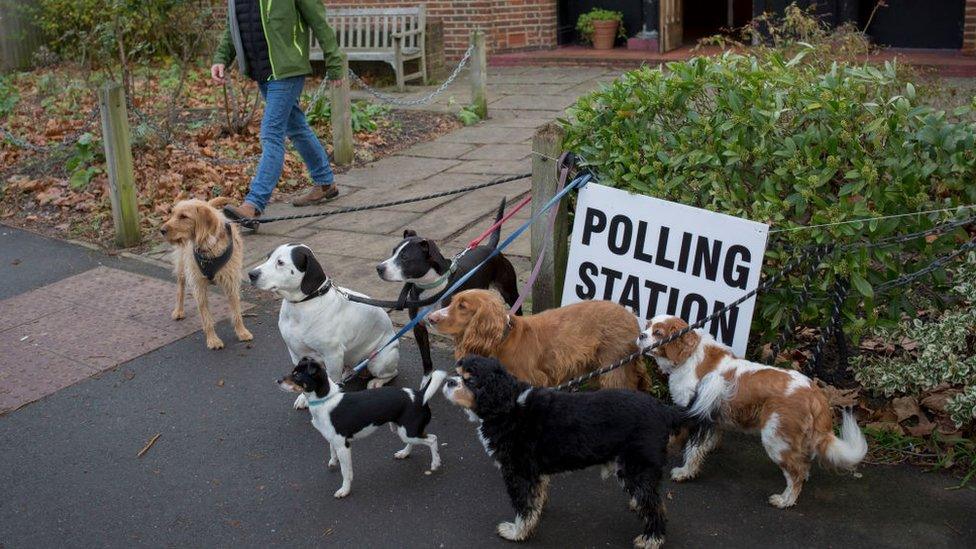
Dogs may need to be more socially distant at polling stations in 2021
Why don't we all vote by post?
Voting by post is expected to be a big feature of the coming election - but current plans would not allow for everyone to mail in their ballots.
It was already a growing trend, external - 3.6% of the electorate registered for a postal vote in 2003, then 11.2% in 2007, 14.1% in 2011, and 17.7% in 2016 - and surveys suggest more Scots than ever will want to take the socially-distant option to cast their vote in 2021.
At present only 17% of the electorate have signed up for a postal ballot, but officials are braced for this to surge to up to 40% once campaigning gets under way - with parties expected to urge their supporters to sign up en masse.
The challenge will be what happens if an even greater number than that apply. The deadline for postal registrations has already been brought forward to provide time to process the expected wave of applications.
If, say, half of the electorate were to ask for a postal ballot, the Electoral Management Board have voiced fears the election would have to be pushed back in order to get through the paperwork.
And they say an all-postal election likely would not be possible until November, such would be the burden of signing up all 4.2m Scottish voters to the system.
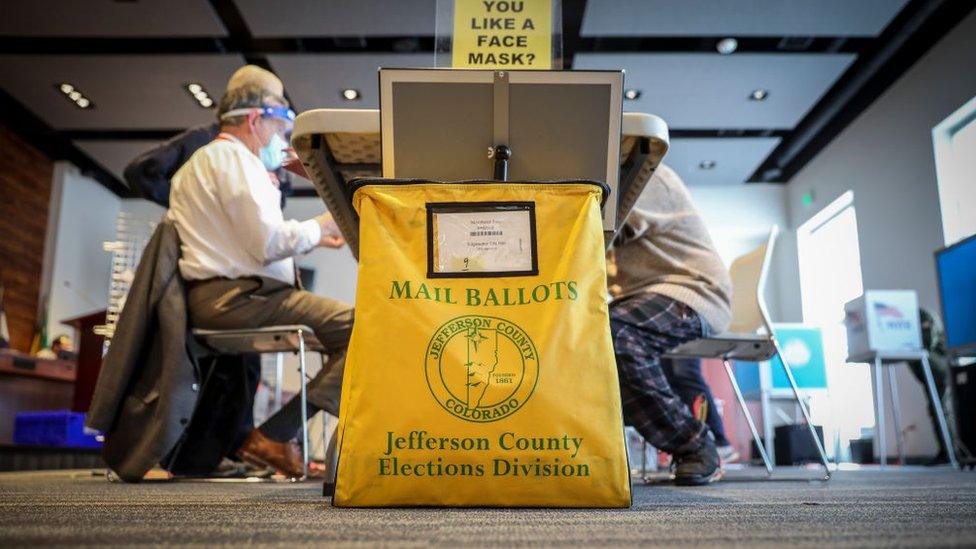
Mail-in ballots played a significant role in the US presidential election
Where and when might people vote in person?
One contingency plan on the table is to hold polling across more than one day - potentially even with different age groups voting on different days.
Several parties - Labour, the Greens and Lib Dems - have voiced cautious support for multi-day polling. However the Election Management Board have stated a preference for voting on a single date, and both the SNP and Tories are behind that position.
Another consideration is where votes are cast. For the most part, there are few concerns about polling places becoming the epicentre of new outbreaks - they are highly regulated environments at the best of times, and officials say they would pose no more risk than a supermarket.
However, the Electoral Commission have said they might reconsider using schools as polling places, particularly if voting does take place over more than one day, due to the risk of disrupting education still further.
Within polling places, more stations where voters can cast their ballot may be set up, to reduce queues - which would require extra staff to be taken on.
One final question applies to when votes might be counted. Talks have been held about whether the traditional overnight count - with staff packed into community centres and gym halls - would go ahead as normal, or whether results could be tallied at a more sedate pace the following day.
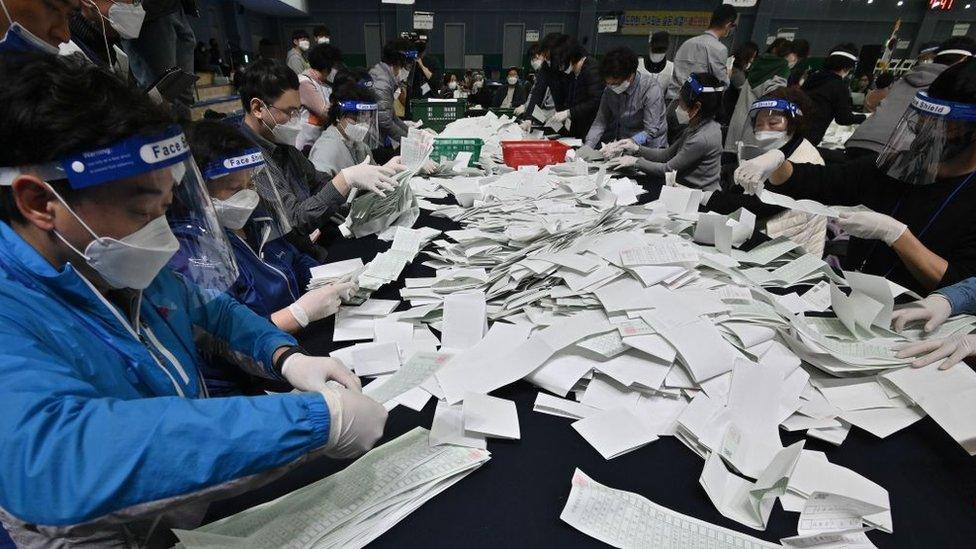
Extra precautions will likely be needed at election counts too
What would the campaign be like?
The election campaign is due to officially begin in March - although arguably some parties have already been in campaign mode for some time now.
It seems highly unlikely that social distancing guidelines will have been relaxed enough by then for politicians to go out shaking hands and kissing babies.
Indeed there have been complaints in some quarters about candidates going out knocking on doors during selection contests, so the traditional "boots on the ground" approach will likely take a back seat to the "air war" of wider messaging.
The US election is likely to be instructive - Joe Biden managed to win the presidency despite rarely leaving the house.
One final wrinkle is that this year, MSPs will likely still be MSPs right up to polling day.
Normally in an election year, Holyrood would shut down in late March. However this year "dissolution" is likely to be delayed until the day before polling, in case parliament needs to be recalled in an emergency.
This is mostly a technical matter - Holyrood would be in recess, so members wouldn't be prevented from campaigning - but would mean members were bound by the MSPs code of conduct throughout the election period.